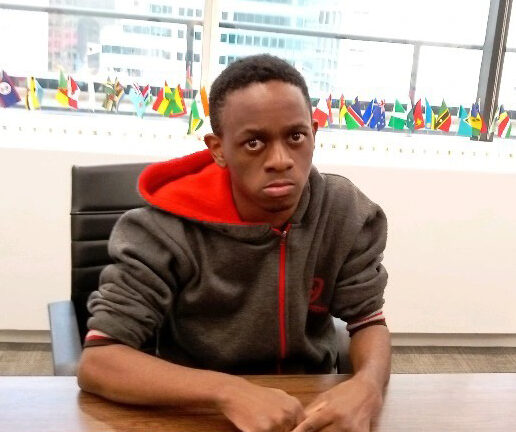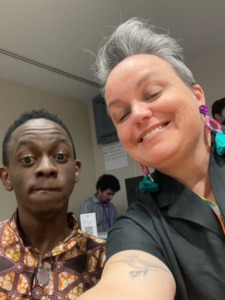Chasing My Childhood Dream: Shedding Light on the Barriers in the Ugandan Education System
By Kihembo Wilbert, Commonwealth Disabled People’s Forum (CDPF) Youth Representative and Executive Director of the Voice of the Youth with Disabilities (VYD) organization, Uganda

My journey through education as a person living with Cerebral Palsy has been a testament to resilience, determination, and the transformative power of inclusive education. Sharing my story sheds light on the barriers faced by Disabled people within the Ugandan education system.
Technology for Inclusive Education
From a young age, I harboured a burning desire for knowledge and the dream of earning a PhD. At the tender age of five, I expressed my longing for education, and my parents recognised its profound significance in my life. With unwavering dedication, they enrolled me in a private school believing that it would provide an inclusive environment that would nurture my growth and foster a sense of belonging. Throughout my primary education, I encountered numerous barriers as a Disabled student. For instance, the act of writing with a pen proved to be a significant challenge, often leaving my teachers struggling to decipher my handwriting. However, my educational journey took a remarkable turn when I recieved a laptop. This technological marvel transformed my academic pursuits, enabling me to write legibly and comfortably. With this invaluable tool, I excelled in my final national examinations, attaining a distinction with a first-grade distinction.
Embarking on my secondary education in 2014, I continued to rely on technology as my steadfast ally. Utilising a laptop for studying and completing exams not only boosted my academic performance but also empowered me to actively engage in classroom discussions, collaborate with classmates, and explore an extensive array of educational resources online. Technology became the catalyst that enabled me to make remarkable strides in my education and improved my experience.
Embracing Online Learning
The pursuit of my childhood dream to obtain a bachelor’s degree faced a significant setback when I did not achieve the required grades for direct enrolment. Undeterred, I enrolled in a computer science diploma program at the International University of East Africa. The unforeseen arrival of the COVID-19 pandemic necessitated a shift to online learning, which proved to be a blessing in disguise. Embracing the virtual classroom, I seized the opportunity to acquire knowledge and hone my skills from the comfort of my own home, determined to navigate any obstacle and not let them hinder my educational journey.
However, the path to my bachelor’s degree encountered further challenges. The university I initially chose discontinued its online system, making on-campus attendance compulsory. This presented insurmountable barriers related to accessibility, transportation, and financial constraints. Faced with the heart-wrenching decision, I had to discontinue my studies at that institution, putting my childhood dream temporarily on hold.
Yet, my unyielding determination refused to be defeated. A glimmer of hope emerged in the form of Cavendish University, which offered an online system for pursuing a bachelor’s degree in Information Technology. This lifeline allowed me to continue my studies without the limitations of physical attendance.
Addressing the Educational Barriers
It is crucial to acknowledge the different barriers posed by the Ugandan education system for Disabled students. Limited accessibility, inadequate resources, and a lack of inclusive pedagogy hinder their educational progress, perpetuating exclusion and limiting opportunities.
The absence of inclusive infrastructure and facilities in many Ugandan schools creates a daunting environment for Disabled students. Scarce funding and a lack of assistive devices, such as wheelchairs, hearing aids, and braille materials, further exacerbate the difficulties they face. The educational curriculum often fails to address Disabled people’s unique needs and learning styles, hindering their academic potential and personal growth.
Moreover, the deeply entrenched stigma and discrimination against Disabled people within the Ugandan society can cause profound emotional pain. Negative attitudes and a lack of understanding from teachers, peers, and society at large can isolate and undermine their self-worth. Insufficient awareness and training among educators in inclusive pedagogy only perpetuate missed opportunities and untapped potential for Disabled students.
One significant aspect of fostering disability inclusion is providing Disability Equality Training to business leaders and public service professionals. We need to educate doctors, nurses, civil servants, social workers, teachers, and lecturers about the shift from a medical to a social human rights approach to disability equality. By raising awareness and promoting disability equality, we can challenge stereotypes and prejudices that exist within our communities and institutions.
Youth Leadership and Digital Inclusion in Rural Uganda
In many rural areas, such as my hometown of Kasese, the situation is even direr. The isolation and depression faced by Disabled youth due to the lack of understanding and support are alarming. It is time for change. Organisations fighting for disability rights must ensure that the voices of Disabled youth are heard. Disabled youth leaders should be trained, empowered, and given the opportunity to take the lead. Commonwealth Disabled Peoples Forum has been organising Youth Leadership Training since 2021, and this year’s training will commence in September. While the current format is online, it is essential to make it more impactful and effective for Disabled youth in rural areas with limited or no internet access. In-person training can bridge the digital divide and reach those who need it the most.
Digital inclusion is another area that must be prioritised. Digital inclusion enables Disabled people to lead more independent lives and help to reduce social isolation. We must develop strategies to promote digital inclusion for Disabled people. This includes making websites and digital services accessible, providing training and assistance, and ensuring that all digital communications across the Commonwealth and within governments are accessible. Additionally, increasing the free access points to the internet will help bridge the digital divide.
I have utilised my digital skills to establish an online radio station called Snow FM, which advocates for disability rights. It serves as a platform to amplify the voices of Disabled people and promote inclusivity. These initiatives demonstrate the immense potential that digital skills hold for Disabled youth.
A Call for Inclusive Education and Building an Inclusive Society in Uganda
I continue to remain resolute in my pursuit of education and my childhood dream of earning a PhD. My journey is not only a testament to my personal resiliance but also a call to action for the Ugandan education system. It is essential to invest in inclusive infrastructure, provide specialised resources and support services, and prioritise comprehensive teacher training in inclusive pedagogy. By fostering an educational environment that embraces diversity and accommodates diverse learning styles and needs, we can empower Disabled people and create a more inclusive and compassionate society.
By Kihembo Wilbert, Commonwealth Disabled People’s Forum (CDPF) Youth Representative and Executive Director of the Voice of the Youth with Disabilities (VYD) organization, Uganda
![Allfie [logo]](https://www.allfie.org.uk/wp-content/themes/allfie-base-theme/assets/img/allfie-logo-original.svg)




